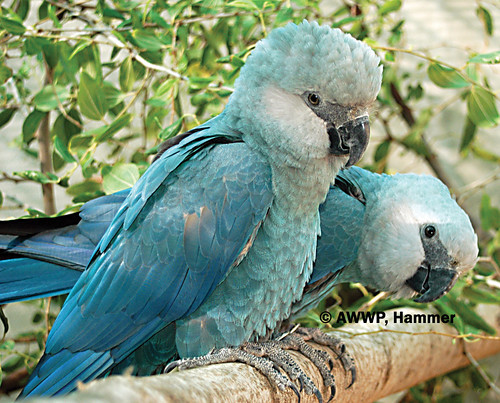 Spix’s Macaw / Cyanopsitta spixii. Photo: AWWPDOHA: A flock of rare parrot species, presently under captive breeding in Qatar, will soon fly back to their natural habitat in Brazil. The 50 Spix’s Macaws (Cyanopsitta spixii) which are undergoing an international breeding program at Al Wabra Wildlife Preservation (AWWP) would be re-located at the vast Concordia Farm in Brazil, recently bought by the AWWP.
Spix’s Macaw / Cyanopsitta spixii. Photo: AWWPDOHA: A flock of rare parrot species, presently under captive breeding in Qatar, will soon fly back to their natural habitat in Brazil. The 50 Spix’s Macaws (Cyanopsitta spixii) which are undergoing an international breeding program at Al Wabra Wildlife Preservation (AWWP) would be re-located at the vast Concordia Farm in Brazil, recently bought by the AWWP.
The AWWP, owned by Sheikh Saoud bin Mohammed bin Ali Al Thani, announced that it has purchased the farm, which is a natural habitat of Spix’s Macaws. Located in Bahia State in the district of Curaca, the 2,200 hectare Concordia Farm is within the most historically significant range of Spix’s Macaw. The farm was also the base of the Spix’s Macaw field project.
With various shades of blue, including pale blue head, dark blue wings and tail, the Spix’s Macaw species is the most critically endangered parrot in the world. The species was feared to be possibly extinct in the wild in the early 1980s, until it was rediscovered in 1985, when just five birds, including two pairs, were located in the north of Bahia. Currently there is approximately 120 individual Spix’s Macaws in captivity. Seventy eight of these are participating in the international breeding program managed by the Institute Chico Mendes of Biodiversity Conservation (ICMBio), the Natural Heritage branch of the Brazilian government. Fifty of these are managed at AWWP, where the captive breeding program is guiding the Spix’s Macaw, a step closer to re-locating to its natural habitat in Brazil.
“AWWP secured the Concordia Farm for the Spix’s Macaw and plans to allow it to return to a more natural habitat by removing domestic livestock. In the long term, we hope that this land will prove to be a valuable habitat resource for plans in the future to re-establish Spix’s Macaws back to the wild”, said Marie James, Public Relations Officer of the AWWP.
Of the 50 Spix’s Macaws in AWWP, 29 are females. In the last three years, 16 Spix’s Macaws have been bred at the AWWP. All chicks bred at the AWWP have been hand-reared by experienced staff, since it is considered a safer option than parent-rearing and the priority at the moment is to increase its population. When the captive population is considered secure, breeding pairs will be given the opportunity to raise some of their own young